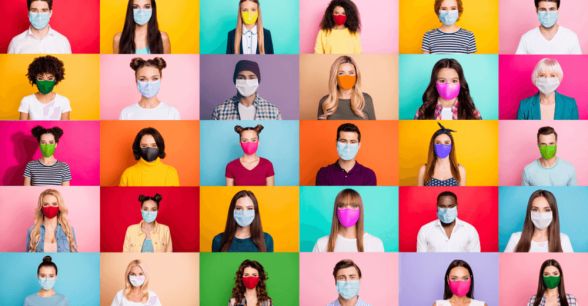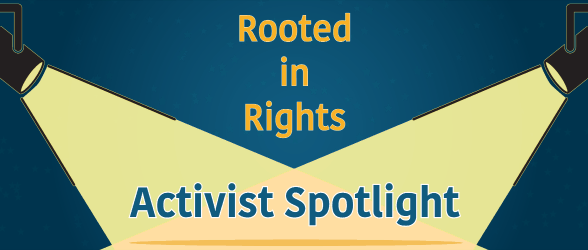Existing Between Two Worlds as a Person with Hearing Loss
When I was growing up, I did not consider myself to be a member of the disability community. I was born with a mild-to-moderate hearing loss that was not diagnosed until I was in kindergarten and I am the only person in my family to have non-age-related hearing loss. After my diagnosis, adults around me told me that I had an impairment, that something was wrong with me. I was not told about Deaf and disability pride, nor was I given the opportunity to learn American Sign Language.
In elementary school, I came to resent being hard of hearing. Some of my classmates called me “weird” and “different,” and though they did not say why, I could tell it was because I wore hearing aids. When I asked someone to repeat what they said, I would sometimes be met with the question, “Are you deaf?” This only cemented in my mind that having a hearing loss was bad. But in third grade, another girl in my year was diagnosed with hearing loss. This was a relief for me. Not only was I picked on less, but also I was no longer the only one who was different.
As an adult, I have found that almost no one makes remarks – at least to my face – about me being hard of hearing. But even though I am not being bullied, I still feel left out because of the ever-so-common issue of inaccessibility. In university, I took advanced French language classes and always struggled with listening portions of exams, which consisted of pre-recorded audio so I could not see the speaker’s face. When I asked for accommodations, I was told that I could get extended time, which was not helpful. No matter how hard I worked, there were barriers to my success. Now, when I am speaking on a group call or interviewing someone for an article, I have a hard time advocating for my own needs. I know that having a video call on a platform like Google Meet (which has decent free automated captions) would help me, but it is difficult explaining this to people who are not hard of hearing.
When I am frustrated by inaccessibility, I seek support. Although my hearing friends always validate my feelings, I am still searching for acceptance from a community of people who understand what it is like to have a hearing disability like mine. It wasn’t until high school that I first started to learn about the Deaf community and Deaf culture. Both Gallaudet University and the National Technical Institute for the Deaf, schools where the primary language is American Sign Language (ASL), reached out to me to apply for their programs. But after researching both schools, I feared I would feel lonely if I went to either of them because I did not know how to communicate in ASL, which meant I would likely not be able to fit in again.
I finally started to identify as being a member of the disability community while in university after developing a rare autoimmune disorder, systemic urticarial vasculitis. While I tried to adjust to being chronically ill, I found support in Facebook groups. As I started to feel like a part of the disability community, I began to examine why I had not felt that way previously, considering how long I have been hard of hearing. And then it hit me: Even when I was undiagnosed, I found that people did not question my place in the chronic illness community. I would introduce myself by sharing some of my symptoms and explaining that I didn’t have a diagnosis, and members of the Facebook groups would validate my experiences and frustrations.
On the other hand, I’ve often felt like there seems to be an invisible set of requirements for hard of hearing people to be welcome in the Deaf community. For example, in the show Deaf U, Daequan described the criticism that he received from others at Gallaudet for not signing all the time. I am also able to “pass” in the hearing community, meaning that it’s easier for me to fit into hearing communities without most people knowing of my disability than it would be for me to fit into the Deaf community.
I used to keep my frustration with being stuck somewhere in between hearing and Deaf worlds to myself, which made me feel more alone. But my challenges in navigating hearing and non-hearing worlds are no longer invisible. And I no longer think that being hard-of-hearing is a sign that there is something wrong with me. When I was little, I wanted my hearing loss to go away to be “like everyone else,” but now I don’t. My hearing loss is a part of who I am.
About Rooted In Rights
Rooted in Rights exists to amplify the perspectives of the disability community. Blog posts and storyteller videos that we publish and content we re-share on social media do not necessarily reflect the opinions or values of Rooted in Rights nor indicate an endorsement of a program or service by Rooted in Rights. We respect and aim to reflect the diversity of opinions and experiences of the disability community. Rooted in Rights seeks to highlight discussions, not direct them. Learn more about Rooted In Rights




I am also hard of hearing. My hearing loss occurred as an adult. I have experienced some of the same challenges. As a lawyer, the hearing loss presents several challenges. I live with multiplayer disabilities. I am learning disabled and I have high functioning Autism. Navigating the world with “invisable disabilities is difficult. As you say, it’s part of who I am. It spurs on my creativity and passion .